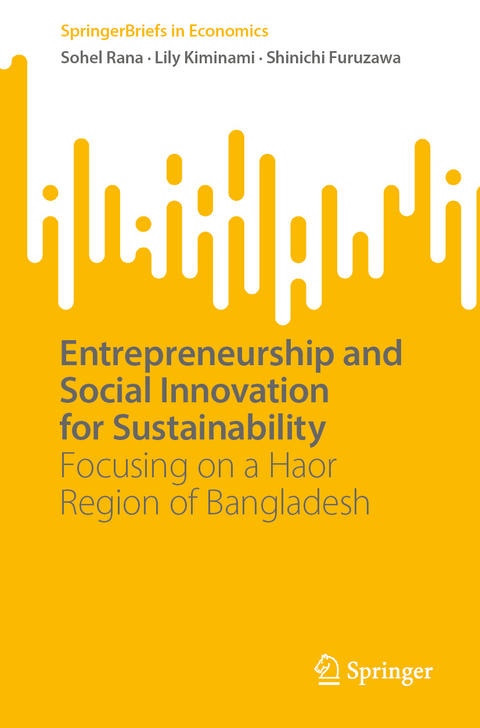
Entrepreneurship and Social Innovation for Sustainability
Focusing on a Haor Region of Bangladesh
Seiten
2022
|
1st ed. 2022
Springer Verlag, Singapore
978-981-19-7114-3 (ISBN)
Springer Verlag, Singapore
978-981-19-7114-3 (ISBN)
This book aims to assess the roles of entrepreneurship and social innovation for socio-cultural changes. It also evaluates farmers’ performance in disaster risk management at a community level toward sustainable regional development in a rural haor region of Bangladesh. To achieve the purpose of the research, both a qualitative method (Trajectory Equifinality Modeling, TEM) and a quantitative method (Structural Equation Modeling, SEM) are introduced, based on the results of case studies on local entrepreneurs, interview and focus group discussions with stakeholders, and questionnaire surveys of farm households.
First, the results clarify that social capital is critically important both for male and female entrepreneurs in the haor region, and that education is more important to women for empowerment and technology adoption in the entrepreneurial ecosystem in the haor region of Bangladesh. In addition, it makes clear that the Common Interest Group approach plays a role for women’s empowerment in the target region. Furthermore, it identifies the multi-causal relationships among the factors affecting farm households’ performance in disaster risk management at the community level.
This book helps readers to understand regional development through social and cultural transformation in a rural community where poverty and gender discrimination are path-dependent problems.
First, the results clarify that social capital is critically important both for male and female entrepreneurs in the haor region, and that education is more important to women for empowerment and technology adoption in the entrepreneurial ecosystem in the haor region of Bangladesh. In addition, it makes clear that the Common Interest Group approach plays a role for women’s empowerment in the target region. Furthermore, it identifies the multi-causal relationships among the factors affecting farm households’ performance in disaster risk management at the community level.
This book helps readers to understand regional development through social and cultural transformation in a rural community where poverty and gender discrimination are path-dependent problems.
Sohel Rana, Chattogram Veterinary and Animal Sciences University Lily Kiminami, Niigata University Shinichi Furuzawa, Niigata University
1. Introduction.- 2. Literature Review on Regional Development, Entrepreneurship, Social Innovation and Disaster Risk Management.- 3. Regional Characteristics of the Target Region.- 4. Research Framework, Hypotheses and Methods.- 5. Role of Entrepreneurship in Socio-cultural Changes.- 6. Socio-political Transformation through the CIG Approach.- 7. Performance of Farm Households in Disaster Risk Management at Community Level.- 8. General Conclusions and Policy Implications.
| Erscheinungsdatum | 09.11.2022 |
|---|---|
| Reihe/Serie | SpringerBriefs in Economics |
| Zusatzinfo | 2 Illustrations, color; 22 Illustrations, black and white; XV, 89 p. 24 illus., 2 illus. in color. |
| Verlagsort | Singapore |
| Sprache | englisch |
| Maße | 155 x 235 mm |
| Themenwelt | Wirtschaft ► Volkswirtschaftslehre ► Wirtschaftspolitik |
| Weitere Fachgebiete ► Land- / Forstwirtschaft / Fischerei | |
| Schlagworte | Common Interest Group Approach • Disaster Risk Management • Entrepreneurship • Regional Development • Social Innovation • socio-cultural transformation |
| ISBN-10 | 981-19-7114-5 / 9811971145 |
| ISBN-13 | 978-981-19-7114-3 / 9789811971143 |
| Zustand | Neuware |
| Informationen gemäß Produktsicherheitsverordnung (GPSR) | |
| Haben Sie eine Frage zum Produkt? |
Mehr entdecken
aus dem Bereich
aus dem Bereich
Theorie und Anwendung
Buch | Hardcover (2024)
Vahlen, Franz (Verlag)
CHF 55,70
wie sich unsere Wirtschaftspolitik ändern muss, damit wir globale …
Buch | Hardcover (2024)
Wiley-VCH (Verlag)
CHF 55,95
ausgehandelt? – wie offen ist die Weltgesellschaft?
Buch | Softcover (2024)
UTB (Verlag)
CHF 30,80


